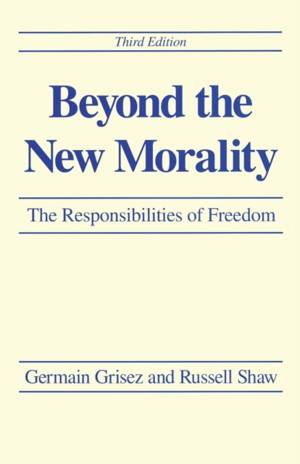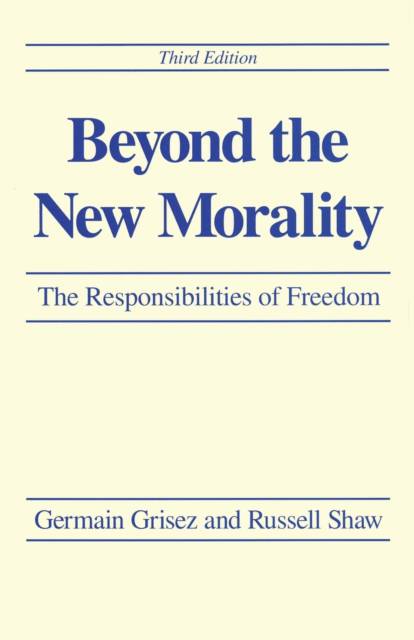
- Retrait gratuit dans votre magasin Club
- 7.000.000 titres dans notre catalogue
- Payer en toute sécurité
- Toujours un magasin près de chez vous
- Retrait gratuit dans votre magasin Club
- 7.000.0000 titres dans notre catalogue
- Payer en toute sécurité
- Toujours un magasin près de chez vous
Beyond the New Morality
The Responsibilities of Freedom, Third Edition
Germain Grisez, Russell ShawDescription
First published in 1974, with a second, revised edition in 1980, Beyond the New Morality, third edition, retains the best elements of the earlier versions, including the authors' clear, straightforward presentation and use of nontechnical language. Although the basic approach, content, and organization remain substantially the same, the new edition does develop and amend some aspects of the theory. For example, the community dimension of morality is brought out more clearly and the first principle of morality is now formulated more accurately in terms of willing in line with integral human fulfillment.
We are proposing an ethics. But what is ethics? As we use the word, it means a philosophical study of morality, of the foundations on which morality is based, and of the practical implications of a systematic moral outlook. We believe ethics must start by clarifying the fundamental notions of freedom, action, and community. Then it can go on to examine the question "What is the ultimate distinction between moral good and moral evil, between action which is right and action which is wrong?" An answer becomes useful in practice, however, only after one has worked out a satisfactory way of thinking through concrete moral issues--"Should I do this or that?" Thus we next turn to the problem of establishing basic moral principles. Finally, once one is in a position to take a reasoned view of moral issues, it is possible to ask and try to answer the question "To what extent can I close the gap, in my life and in society, between the way I think things ought to be and the way they are?"
History studies human actions, but it looks at particular actions which have actually taken place; ethics is concerned with human action in general or with possible kinds of actions. Psychology and the social sciences also have somewhat the same subject matter as ethics, but they arc mainly concerned with how human beings actually do act and societies actually do work; ethics concentrates on how persons ought to act and societies ought to be formed and reformed.
Spécifications
Parties prenantes
- Auteur(s) :
- Editeur:
Contenu
- Nombre de pages :
- 272
- Langue:
- Anglais
Caractéristiques
- EAN:
- 9780268006792
- Date de parution :
- 30-09-88
- Format:
- Livre broché
- Format numérique:
- Trade paperback (VS)
- Dimensions :
- 135 mm x 213 mm
- Poids :
- 317 g

Les avis
Nous publions uniquement les avis qui respectent les conditions requises. Consultez nos conditions pour les avis.






